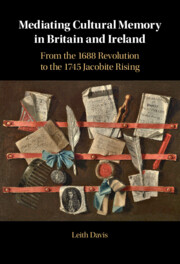 Mediating Cultural Memory in Britain and Ireland
Mediating Cultural Memory in Britain and Ireland “Living On” after 1745: From Cultural Memory to the Memory of Culture
Published online by Cambridge University Press: 10 March 2022
The Conclusion traces the afterlife of the knots of memory examined in earlier chapters in two printed genres: the multi-volume histories of the nation that became popular in the late eighteenth century and the historical novel in the hands of Walter Scott. Works such as David Hume’s and Tobias Smollett’s histories replicate some of the counter-memories that were produced in the earlier printed discourse on the nation. Scott, however, transforms the complicated knots of memories and counter-memories by drawing attention to and framing them. Waverley, for example, both acknowledges the power of counter-memories and prevents their re-activation by including them within a narrative that connects a progressive sense of a consolidated British cultural memory with a model of media succession.
To save this book to your Kindle, first ensure no-reply@cambridge.org is added to your Approved Personal Document E-mail List under your Personal Document Settings on the Manage Your Content and Devices page of your Amazon account. Then enter the ‘name’ part of your Kindle email address below. Find out more about saving to your Kindle.
Note you can select to save to either the @free.kindle.com or @kindle.com variations. ‘@free.kindle.com’ emails are free but can only be saved to your device when it is connected to wi-fi. ‘@kindle.com’ emails can be delivered even when you are not connected to wi-fi, but note that service fees apply.
Find out more about the Kindle Personal Document Service.
To save content items to your account, please confirm that you agree to abide by our usage policies. If this is the first time you use this feature, you will be asked to authorise Cambridge Core to connect with your account. Find out more about saving content to Dropbox.
To save content items to your account, please confirm that you agree to abide by our usage policies. If this is the first time you use this feature, you will be asked to authorise Cambridge Core to connect with your account. Find out more about saving content to Google Drive.